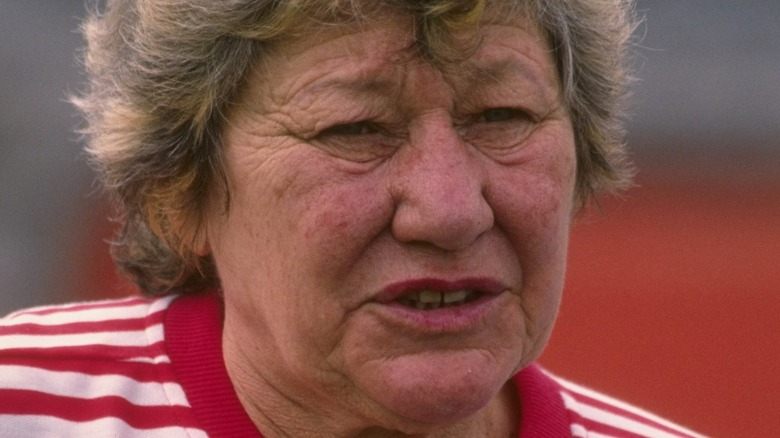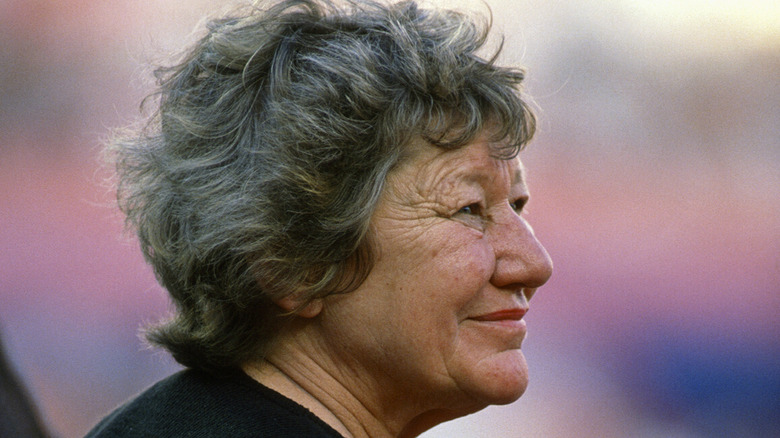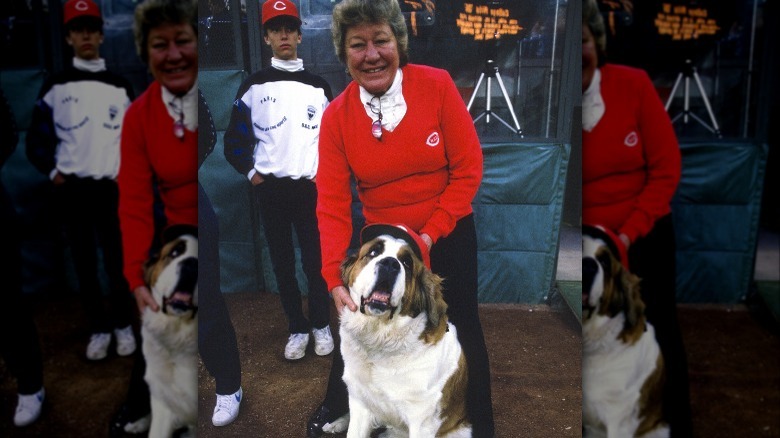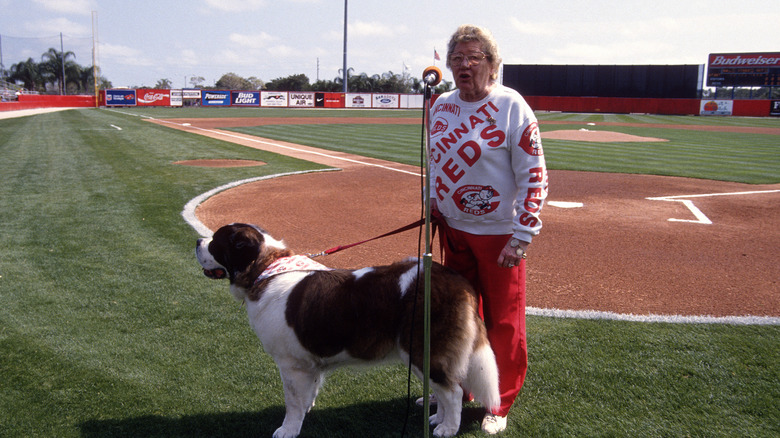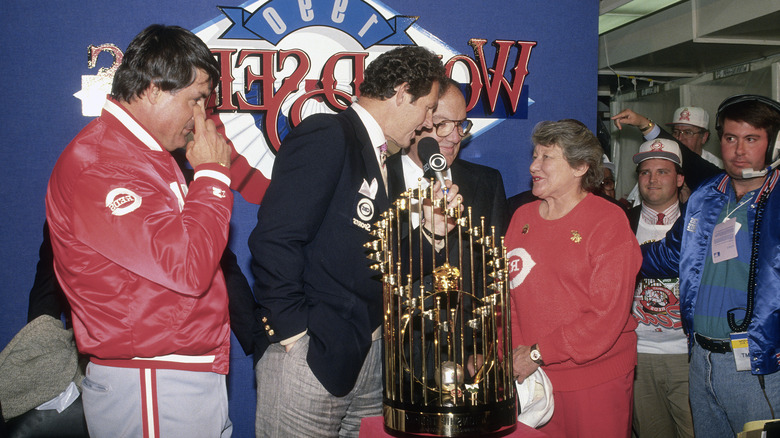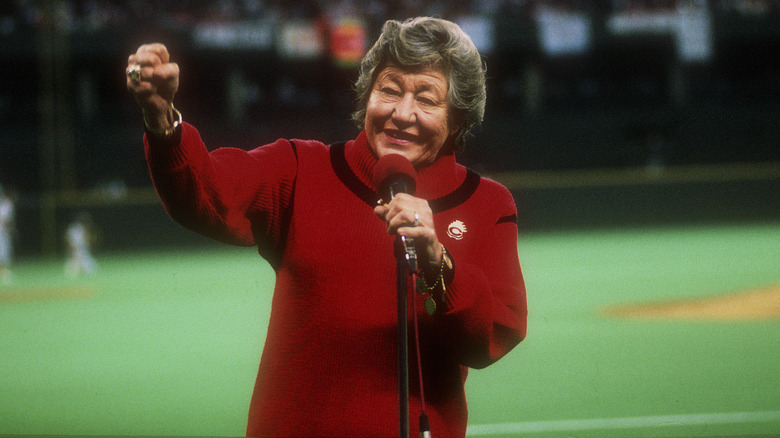Marge Schott Lost Ownership Of Her MLB Team Because Of This Disturbing Truth
It would be very easy to assume that as only the second woman in American professional sports history to own a team acquired in a way other than inheritance, Marge Schott would be held up as a shining example to women in sports. You'd be completely wrong, because instead, Marge Schott — the former owner of the Cincinnati Reds — is remembered as arguably one of the most controversial figures in sports history, and a team owner who went from popular with fans to one that was reviled (via SABR).
Schott's obituary in The New York Times features a headline that reads, "Marge Schott, Eccentric Owner of the Reds, Dies at 75." That's certainly one way of putting it, although it's a bit of an understatement. Schott was at first known for being an eccentric businesswoman and socialite who gave her enormous St. Bernard dog the run of the team's facilities. Eventually, her tight-fisted management style drew attention. But it was her offensive racial and ethnic remarks — and once saying in an interview that "Hitler was good in the beginning, but he went too far” — which wound up getting Schott blackballed from Major League Baseball.
Marge Schott's early career
Schott was born Margaret Unnewehr in Cincinnati in 1928, and her maiden name was led to her being teased. "Kids used to tease me about that name," she said. "They'd call me 'Un-aware' and 'Underwear,'" she said, according to SABR. In the early 1950s, she married Charles Schott, a man who came from a wealthy family and who owned several businesses, including a car dealership and a brick-making factory.
Her husband died of a heart attack in 1968 at just 42 years old, which thrust the Schott — a widow, and herself just 38 years old — into controlling her husband's business assets. Schott faced pushback from General Motors, who tried to take away her license to run her late husband's Buick dealership. After two years of battling, GM gave in and Schott was officially the first woman to run a major market car dealership.
All the while, Schott was attracting attention for her eccentric behavior, including one instance where she showed up to a formal ball with a date — only the date was a dancing bear. Bizarre, but ultimately harmless antics helped elevate her public profile. In 1981 she bought a stake in her hometown Major League Baseball team, the Cincinnati Reds.
Marge Schott buys the Reds
According to Britannica, the Cincinnati Reds can trace their lineage back to the Cincinnati Red Stockings, who began play in 1869 and were the first professional baseball team. Schott became part of a team that had their Big Red Machine days behind them, an era in the team's history where they were headlined by Pete Rose, Joe Morgan, and Johnny Bench. The team continued to draw respectable crowds, despite playing in one of the league's smallest markets, per SABR.
The team hit a lull in the early '80s with seasons that put them square at the bottom of the league standings. Two major changes came within the team leadership in 1984. First was Pete Rose being named as the team's manager, and the second was Schott increasing her ownership in the team by dolling out $24 million for a controlling stake in the club. Her first press conference as the majority owner of the team included an appearance from her 170-pound St. Bernard named Schottzie, who was even wearing a Reds hat for the occasion (via The New York Times).
The Reds under Marge Schott
Almost from the start, problems began to arise, but these could be chalked up to Schott's eccentricities. For starters, Schottzie became a frequent presence around the ball club. According to SABR, Schott declared her dog the team's new mascot and gave the massive animal free rein to run around the team's Riverfront Stadium before games. This bothered some of the players, who complained that they had to watch their step before games. Even Pete Rose had a run-in with the Schottzie. While visiting the team owner at her home, the St. Bernard drooled all over Charlie Hustle's lap. Rose wrote in his memoir that Schott reminded him, "The dog lives here, Pete. You're just visiting."
The issues dcontinued in the late 1980s, though by then they were bigger than a free-range Schottzie. Rose was banned form baseball for betting on games, and Schott's reputation shifted from one of an eccentric owner to one who was known to be tight-fisted. Still, outside the team, Schott was popular with fans, some of whom used to stop by her private box during games. However, in the early 1990s, accusations and direct statements from Marge Schott herself tarnished her image forever.
Marge Schott becomes a pariah for a series of offensive remarks
One of the first signs of trouble came in 1990. While it should've been a momentus occasion, as the Reds won the World Series over the Oakland Athletics, Reds outfielder Eric Davis suffered an injury in the World Series. According to SABR, Davis then claimed that the organization made him pay his way home from the Oakland hospital where he was being treated, with the outfielder even remarking, "If I were a dog, I would have gotten more care, and that's the truth."
According to The New York Times, several former team personnel alleged that Schott had referred to players and team employees by a slew of racial and ethnic slurs. This was the latest in a series of allegations that alleged Schott had used slurs or racist hiring practices. On of these allegations from a former team executive led to a lawsuit, and during a deposition Schott made anti-semitic comments that led to her being suspended from being involved in team operations during the 1993 season. She made another comment in 1996 — her "Hitler was good in the beginning" statement, per The Washington Post — which led to her once again losing control of team operations, from 1996 to 1998.
Marge Schott the paradox
In 1999, she officially lost control of the team but continued to be a limited partner in the franchise. She became persona non grata in Major League Baseball. According to The New York Times, Schott died on March 2, 2004 at the age of 75. Schott left behind a complicated legacy.
Of course, Schott's racist statements were abhorrent, but the thing that was a struggle for Reds fans and Cincinnatians alike was that Schott did some genuinely good things for the city. Balancing those two sides of Schott — which Cincinnati Enquirer columnist Paul Daugherty dubbed Good Marge and Bad Marge, per NPR — is tough. On one hand, Schott was known to donate generously to numerous charitable causes, including the Cincinatti Zoo and the local children's hospital (via The New York Times). Then there was Bad Marge, whose highly-publicized exploits were many. As Daugherty put it shortly after Schott's death, "Good Marge competed with Bad Marge, daily."
